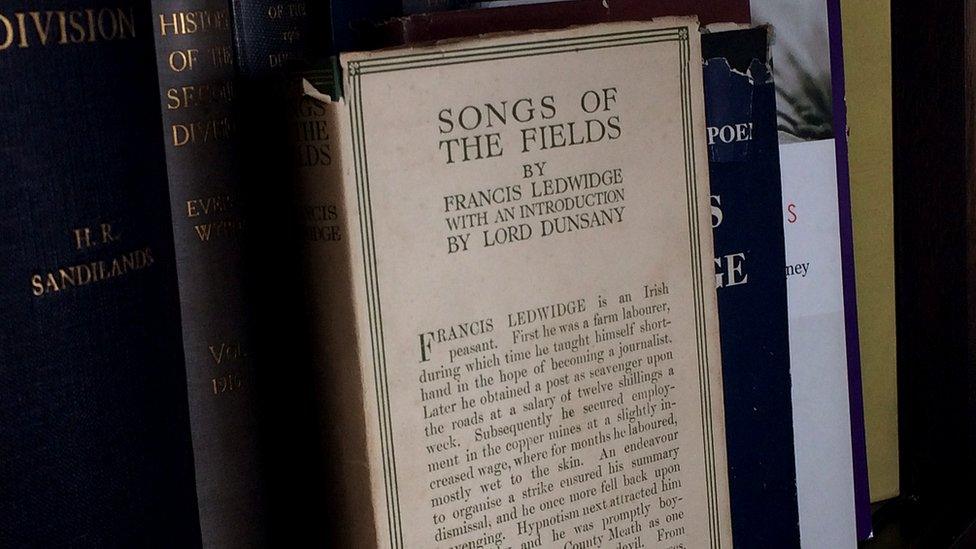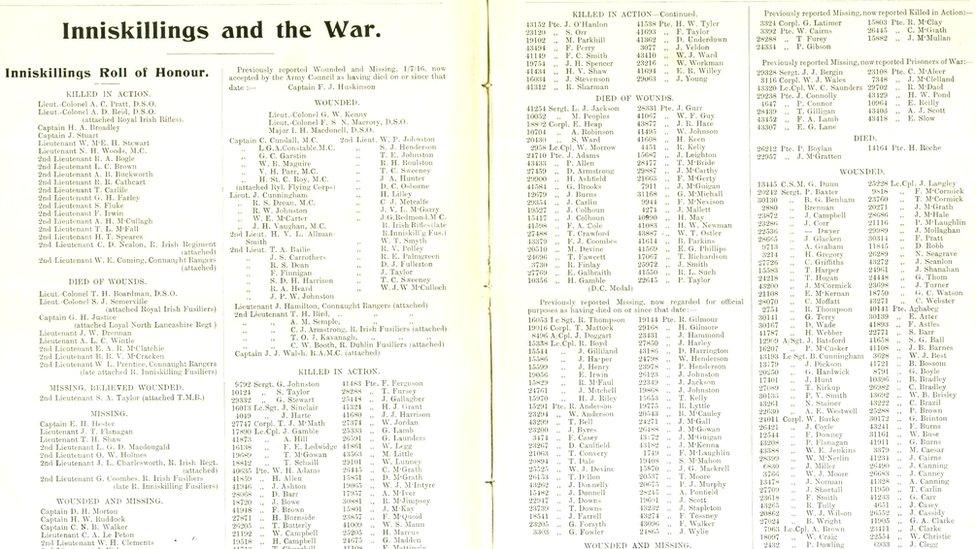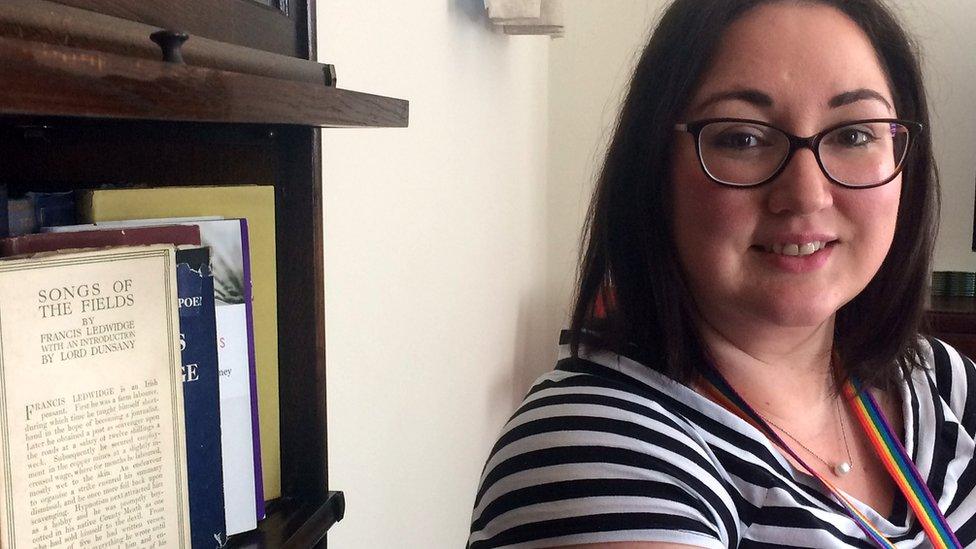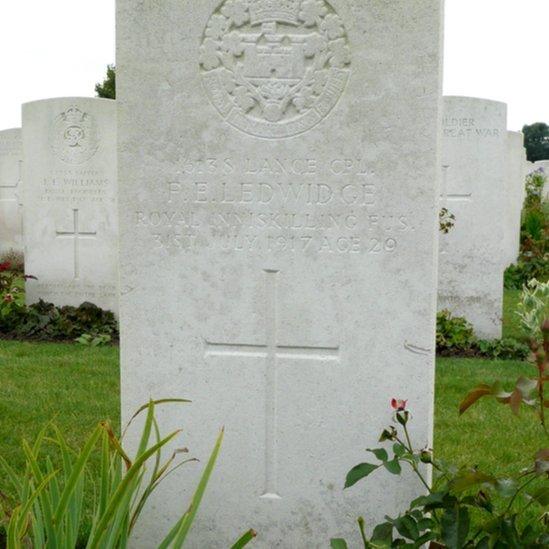Francis Ledwidge: Centenary of death of Irish WW1 poet
- Published

Meath man Francis Ledwidge brought his words to war in a way that has inspired others
Francis Ledwidge was an unusual war poet - a British soldier, an Irish nationalist and a man of peasant background.
He was friends with a leader of the 1916 Easter Rising, the Irish rebellion against British rule, but died fighting for Britain in Passchendaele.
Monday marks 100 years since his death.
He brought his words to war in a way that has not only endured a century since his death, but has inspired others to artistic creativity.
"Shortly after he died, Michael Head, who was a young musician, set four of his poems to music," said John Graham, chair of the Inniskillings Museum Trustees.
"Ivor Gurney, another war poet and musician, set one of them to music and down through the years, he has inspired poetry in others, not least of which is Seamus Heaney."
Heaney wrote In Memoriam Francis Ledwidge.
Ledwidge himself was known as the poet of the blackbirds, because of his love of nature.
He was born in Slane in County Meath, the eighth of nine children.

Ledwidge enlisted in the Inniskillings after war broke out in 1914
The family was poverty-stricken and their situation only became worse when Ledwidge's father died prematurely.
But their mother worked hard to keep her children in school, believing in the value of an education.
Eventually, the children went out to work, but the artistic flame burned bright in young Francis.
He wrote poems from the age of seven and became a published poet in his early teens.
Poor boy who can write poetry
He had the support and backing of Lord Dunsany, a well-known society and literary figure in Dublin. With his support, the young man found himself living an almost double life.
"It's a story which has caught the imagination on so many levels," John said.
"The poor boy who could write poetry was picked up by the local lord and mentored, and introduced to the very smartest of Dublin society.
"He would be off cycling around Meath, working on the roads, then in the evening he would be in Slane Castle, reciting his poetry at very elegant soirées."
Lord Dunsany rated Ledwidge's work so highly he helped prepare and publish all three of the young poet's collections.

Natasha Martin said he is is one of the regiment's most famous soldiers
The first was published the year before he was killed, the last compiled after his death in Passchendaele on service with 5th Battalion, the Royal Inniskilling Fusiliers.
"He probably is one of our most famous soldiers," said Natasha Martin from the Inniskillings Museum in Enniskillen.
"For somebody who was not a commissioned officer, to have a name like Francis Ledwidge with the regiment of the Royal Inniskilling Fusiliers is a fantastic honour."
Inspired by Lord Dunsany's past as an Inniskilling, Ledwidge enlisted after war broke out in 1914.
He served in Gallipoli, the Balkans and in France on the Western Front.
During the Balkan campaign in 1915, he was invalided home with a back injury.
Friend of Rising leader
While he was still recovering, the Easter Rising took place.
Ledwidge was good friends with Thomas McDonagh, one of the leaders of the rebellion and a fellow poet.
When McDonagh was executed for his part, Ledwidge wrote what has become arguably his most famous poem, Lament for Thomas McDonagh.
Despite his background as an ardent patriot and nationalist, Ledwidge returned to the front when his recovery was complete.
He had to earn back his lance-corporal stripes, having been demoted when he overstayed his leave of absence.
"He was taken in by his friend Bob Christie, and his mother had said, 'I've a bed for you here, you're staying the night', as all good Irish mammies do," Natasha said.

Ledwidge died at Passchendaele in 1917
"So that meant when he went back, he was court-martialled.
"He had also been a little disrespectful to his superior officer when the officer made a comment about the Easter Rising. What he said back to the officer wasn't taken very well."
Ledwidge regained his stripes in January 1917. It was while preparing the road for an assault during the Battle of Ypres that a stray shell landed beside the mud hole where he and his crew were taking a break.
He was killed outright.
"A lot of his poetry was quite shocking and striking towards the end," said Natasha.
"It was almost like he knew, and his poetry takes a very pensive turn. He talks a lot about the fact that he won't make it, and should he make it, his poetry will not be the same."
The poet of the blackbirds sang for the last time when his final collection was published by Lord Dunsany the year after his death - but his work continues to fascinate.